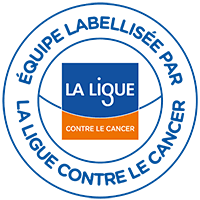Oncogenic functions of β-catenin signaling in the liver (ONCOLIV)

Director :
Sabine Colnot

Deputy Director :
Angélique Gougelet


Primary liver cancer is the second cause of death related to cancer worldwide. Our objective is to unravel the sequence of the events driving liver carcinogenesis, to open new diagnostic and therapeutic opportunities. We focus on β-catenin pathway, driver in one third of hepatocellular carcinomas (HCC) in patients. We mainly based our approach using preclinical transgenic mouse models.
Wnt/β-catenin signaling is a major pathway in the liver, that we showed to be involved in the embryonic development of the liver (Decaens, Hepatology 2008), to be a key player of liver adult homeostasis by controlling liver metabolic zonation (Benhamouche, Dev Cell 2006), and to be a driver pathway initiating liver carcinogenesis (Colnot, PNAS 2004). To study β-catenin-dependent HCC (HCC-βcat), we have created genetically-modified mice such as the Apcko model in which liver cancers emerge due to β-catenin aberrant activation (Colnot, PNAS 2004), and we are currently using the CRISPR/Cas9 strategy to generate new models of HCC. These models are used both to identify how HCC-βcat emerge and progress, and to constitute preclinical models in which therapeutic opportunities arising from our basic research can be easily tested. This is of particular importance knowing the current landscape of HCC, in which HCC-βcat constitute a subclass which are predicted to be resistant to immunotherapies. Diagnosing these HCC and identifying precision medicine targeting specifically HCC-βcat are more than ever critical.
Scientific Themes
Mechanisms and consequences of β-catenin-dependent transcription in liver cancers
Assessing how β-catenin and epigenetics interact to control gene transcription in the hepatocyte Identifying functional consequences on tumor metabolism and epigenetics.
Oncogenic cooperations in β-catenin-dependent HCC
Assessing in vivo in transgenic mice the epistatic relationship between mutated drivers in β-catenin-dependent HCC.
Tumor metabolism in HCC
Identifying how metabolic alterations impact on β-catenin-dependent hepatocarcinogenesis, and using transgenic mice as preclinical models to assess their efficacy.
Main publications
Deleting the beta-catenin degradation domain in mouse hepatocytes drives hepatocellular carcinoma or hepatoblastoma-like tumor growth. Loesch, R., Caruso, S., Paradis, V., Godard, C., Gougelet, A., Renault, G., Picard, S., Tanaka, I., Renoux-Martin, Y., Perret, C., Taketo, M.M., Zucman-Rossi, J., and Colnot, S. (2022). J Hepatol 77, 424-435, link.
Drug-drug interaction between metformin and sorafenib alters antitumor effect in hepatocellular carcinoma cells. Harati, R., Vandamme, M., Blanchet, B., Bardin, C., Praz, F., Hamoudi, R.A., and Desbois-Mouthon, C. (2021). Mol Pharmacol 100, 32-45, link.
ARID1A loss in adult hepatocytes activates beta-catenin-mediated erythropoietin transcription. Riou, R., Ladli, M., Gerbal-Chaloin, S., Bossard, P., Gougelet, A., Godard, C., Loesch, R., Lagoutte, I., Lager, F., Calderaro, J., Dos Santos, A., Wang, Z., Verdier, F., and Colnot, S. (2020). Elife 9, link.
Hepatocellular Carcinomas With Mutational Activation of Beta-Catenin Require Choline and Can Be Detected by Positron Emission Tomography. Gougelet, A., Sartor, C., Senni, N., Calderaro, J., Fartoux, L., Lequoy, M., Wendum, D., Talbot, J.N., Prignon, A., Chalaye, J., Imbeaud, S., Zucman-Rossi, J., Tordjmann, T., Godard, C., Bossard, P., Rosmorduc, O., Amaddeo, G., and Colnot, S. (2019). Gastroenterology 157, 807-822. link
Insulin receptor isoform A favors tumor progression in human hepatocellular carcinoma by increasing stem/progenitor cell features. Benabou, E., Salame, Z., Wendum, D., Lequoy, M., Tahraoui, S., Merabtene, F., Chretien, Y., Scatton, O., Rosmorduc, O., Fouassier, L., Fartoux, L., Praz, F., and Desbois-Mouthon, C. (2019). Cancer Lett 450, 155-168. link
beta-catenin-activated hepatocellular carcinomas are addicted to fatty acids. Senni, N., Savall, M., Cabrerizo Granados, D., Alves-Guerra, M.C., Sartor, C., Lagoutte, I., Gougelet, A., Terris, B., Gilgenkrantz, H., Perret, C., Colnot, S., and Bossard, P. (2019). Gut 68, 322-334. link
Antitumour activity of an inhibitor of miR-34a in liver cancer with beta-catenin-mutations. Gougelet, A., Sartor, C., Bachelot, L., Godard, C., Marchiol, C., Renault, G., Tores, F., Nitschke, P., Cavard, C., Terris, B., Perret, C., and Colnot, S. (2016). Gut 65, 1024-1034. link
T-cell factor 4 and beta-catenin chromatin occupancies pattern zonal liver metabolism in mice. Gougelet, A., Torre, C., Veber, P., Sartor, C., Bachelot, L., Denechaud, P.D., Godard, C., Moldes, M., Burnol, A.F., Dubuquoy, C., Terris, B., Guillonneau, F., Ye, T., Schwarz, M., Braeuning, A., Perret, C., and Colnot, S. (2014). Hepatology 59, 2344-2357. link
Mitogenic insulin receptor-A is overexpressed in human hepatocellular carcinoma due to EGFR-mediated dysregulation of RNA splicing factors. Chettouh, H., Fartoux, L., Aoudjehane, L., Wendum, D., Claperon, A., Chretien, Y., Rey, C., Scatton, O., Soubrane, O., Conti, F., Praz, F., Housset, C., Rosmorduc, O., and Desbois-Mouthon, C. (2013). Cancer Res 73, 3974-3986. link
Apc tumor suppressor gene is the “zonation-keeper” of mouse liver. Benhamouche, S., Decaens, T., Godard, C., Chambrey, R., Rickman, D.S., Moinard, C., Vasseur-Cognet, M., Kuo, C.J., Kahn, A., Perret, C., and Colnot, S. (2006).Dev Cell 10, 759-770. link
Liver-targeted disruption of Apc in mice activates beta-catenin signaling and leads to hepatocellular carcinomas. Colnot, S., Decaens, T., Niwa-Kawakita, M., Godard, C., Hamard, G., Kahn, A., Giovannini, M., and Perret, C. (2004). Proc Natl Acad Sci U S A 101, 17216-17221. link
All publications



